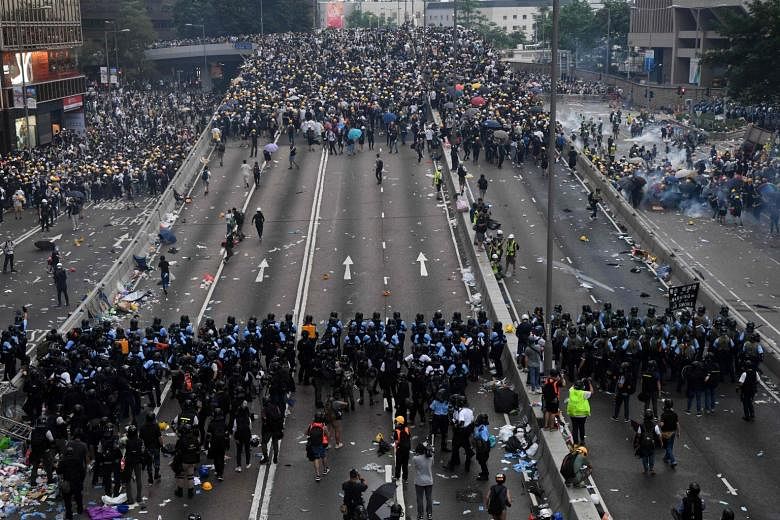HONG KONG • The mass protests in Hong Kong this week are likely to have limited short-term impact on the city's economic outlook, but a potentially more serious one on its long-term prospects.
Demonstrations over the proposed extradition Bill are still at an early stage, compared with the Occupy movement that froze the Central district in 2014.
But the city's external headwinds are higher, and growth has already slowed to the weakest since the 2009 financial crisis.
If unrest over the Bill continues, it could reinforce existing worries that the gradual erosion of autonomy from China will damage its appeal as a financial hub.
"Hong Kong is a Chinese city with Western institutions and the rule of law, and if these qualities are threatened, what would be the advantage of Hong Kong compared with other cities in China?" said Mr Gareth Leather, a senior Asia economist for Capital Economics in London.
There are immediate, localised effects: Pacific Place, a luxury shopping mall, closed on Thursday due to ongoing protests in the area. Dragon boat races scheduled for yesterday, which had been expected to draw around 60,000 spectators, were cancelled.
Protesters blocking key roads in the city's centre and clashing with police resemble the events of late 2014, when pro-democracy activists "occupied" the city for more than 11 weeks, demanding the right to vote in elections to select Hong Kong's leader.
Hong Kong's economic growth had slowed in the fourth quarter of 2014 from the previous period, and the government back then partially blamed that weaker performance on the protests, saying it "affected tourism, hotel, catering, retail and transport industries". The government also said then that "prolonged political bickering is detrimental" to Hong Kong's international image as a stable and efficient city.
Protests and the police reaction to them curtail various aspects of daily life. In the latest case, the city's transport operator had to temporarily suspend services to Admiralty station, which is at the heart of the protest area and takes customers directly to Pacific Place.
Hong Kong's government on Thursday postponed the tender for a plot of residential land estimated to fetch as much as US$1.7 billion (S$2.3 billion). Officials cited blocked access to government buildings as a reason.
Separately, Goldin Financial Holdings said it is dropping its bid for another parcel of land, citing "recent social contradiction and economic instability" that would negatively affect Hong Kong's commercial property market.
"I expect to see more cases like this one in the future as the Bill is considered a serious threat to Hong Kong's 'one country, two systems' framework, the foundation on which international companies come to Hong Kong to conduct business," said Ms Ines Lam, an economist at CLSA. "I also believe that more companies have not expressed their concerns publicly due to their fears of reprisal from Beijing on any criticism of the Bill."
Prior to the protests, the Hong Kong government's official forecast was for the economy to grow between 2 per cent and 3 per cent this year. Economists surveyed by Bloomberg saw the expansion coming in at 2.2 per cent this year, down from 3 per cent last year.
Hong Kong's General Chamber of Commerce, which says it represents businesses employing a third of the local workforce, said on Thursday that large-scale protests show the public has "serious apprehensions" about the Bill.
"We sincerely urge the government to continue to listen to stakeholders and engage in meaningful dialogue with the public," said group chairman Aron Harilela, adding that it agrees with the underlying principle of the Bill.
While there are plenty of concerns about the current protests, Hong Kong's appeal for investors has repeatedly shown resilience, including after the outbreak of the deadly severe acute respiratory syndrome (Sars) virus in the early 2000s, according to Ms Iris Pang, an economist at ING Bank in Hong Kong.
"If Occupy Central and Sars didn't stop foreign investments in Hong Kong, I don't think this will," she said.
BLOOMBERG, REUTERS










